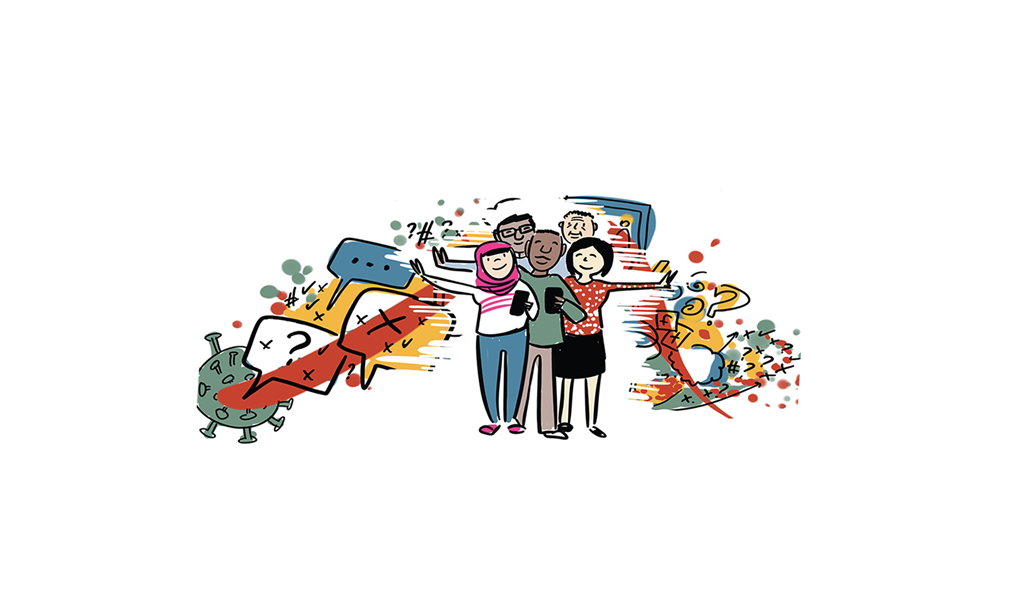It has been nearly three years since the World Health Organization (WHO) officially declared Covid-19 as a pandemic. In a bid to limit the spread of the virus through physical contact, many governments, individuals and businesses increased their support for rapid digitalisation efforts.
During this period, the virtual world became much busier than ever before. More and more people began using their electronic gadgets and devices in order to substitute most in-person activities. Financial technology & e-commerce services were welcomed due to their cashless nature. Terms such as “WFH (Work From Home)” and “online learning” became everyday vocabulary for offices and schools. Social media usage also heightened tremendously with about 44% of internet users worldwide admitting to spending longer on social media such as Facebook, Instagram & Twitter etc. This sharp and sudden increase in people flocking to digital platforms to gain access to information and services combined with the panic and chaos due to uncertainty about the virus and other aspects surrounding its effects created the perfect breeding ground for misinformation related to the virus.
Misinformation, particularly about the virus and its treatments, spread rapidly, especially at the height of the pandemic. This created an increased difficulty for people to make well-informed decisions about their health and well-being. This situation was particularly problematic in countries like Indonesia and Nigeria, with large populations and limited access to accurate information sources. In order to understand the challenges these nations experienced in containing the virus’ spread, it is critical to examine the effects of misinformation on the Covid-19 pandemic response in Indonesia and Nigeria.
According to the WHO (World Health Organization), the COVID-19 outbreak and response were accompanied by a massive infodemic. The term “infodemic” describes a situation whereby there is a sudden, significant increase in the amount of information available on a topic because of an impactful event, like the Covid-19 pandemic. During an infodemic, people usually have a hard time locating credible sources of information when they need it. There will likely be false information, rumours, and conspiracy theories, which can be used to incite fear and distrust among the public. This can be hastened in the modern era through social networks and digital media, spreading like a virus at an exponential rate.
To understand the misinformation situation in both countries, it is important to look at previous research on this topic. In Nigeria, a worldwide survey reported that 88% of Nigerians view social media as a source of their distrust. The survey also showed that only 41% had come across fake news while using traditional media sources, and 47% sometimes believed the fake news they saw. In Indonesia, a nationwide survey conducted in 2020 by the Communications and Information Ministry and Katadata Insight Center (KIC) found that between 64 and 79 per cent of respondents could not recognize misinformation online. Evidently, both countries do serve as ideal breeding grounds for misinformation so it is understandable why they were affected by the infodemic related to Covid-19.
Inaccurate information can spread and be internalized very rapidly, affecting people’s behaviour and possibly motivating them to take bigger risks. All of this worsens the pandemic, affecting more people while endangering the sustainability and impact of global health practices. During the height of the pandemic, inaccurate and false information started circulating about all aspects of the disease. There were rumours about how the Covid-19 virus originated, its cause, its treatment and its method of spreading.
For instance, a widely prevalent hoax at the start of the pandemic used to downplay the seriousness of the virus in both countries was that the virus could not survive the tropical climate because it was too hot for it to survive. Matters were even worsened as government officials like the then Minister of Health in Indonesia, Terawan Agus Putranto, made a series of controversial statements, which underestimated the risks posed by the coronavirus in February & March 2020. Some of Terawan’s statements included ‘Flu is more dangerous than corona virus’ (‘Flu lebih berbahaya daripada virus korona’); ‘we are not afraid of diptheria; of course we are not afraid of COVID-19’ (‘Difteri saja kita tidak takut apalagi korona’); and ‘masks are only for sick people’ (‘Masker itu untuk orang sakit’). Government officials in Nigeria such as the governor of Abia state were also spreading statements like “… [they] have been promised by God that … COVID‑19 won’t get to [the state].” A month later, the governor tested positive for the disease and was admitted into an isolation centre.
Furthermore, misinformation about the Covid-19 vaccines and their development process has played a role in influencing vaccine hesitancy in the public to an extent. Noteworthily, when comparing Covid-19 vaccination rates for both countries, we find that these statistics are very different. For Indonesia, 74% of its approximately 270 million population has received at least one dose of the vaccine while for Nigeria, this percentage is just 36% of its approximately 210 million population. It is important to note that these low numbers for Nigeria can also be attributed to global inequalities that allow rich Global North countries to hoard vaccines and enable a limited vaccine supply to poorer countries amongst other complex factors.
While misinformation was able to spread rapidly during the pandemic, the problem of fake news has always been a serious issue for both nations. In Indonesia, the National Task Force for COVID-19 Response Acceleration (GUGUS TUGAS COVID-19) led by the Indonesian National Agency for Disaster Management (BNPB) to build the country’s official site for Covid-19 response: www.COVID19.go.id. The website has a special section called “Hoax Buster”, created with the help of UNICEF & civil society group, MAFINDO, which includes hundreds of articles, infographics, and other online updates aimed at debunking hoaxes about the virus and methods of treatment. Other non-government initiatives include KawalCovid-19 & Perupadata which consists of volunteers that provide evidence-based Covid-19 information via simplified data visualizations, dispel rumours & provide helpful health tips for Indonesian communities. Indonesian health professionals such as dr. Pandu Riono also contributed to ensuring the public had access to the proper information needed to curb the spread of the virus. While the efforts were greatly appreciated, critics still argue that this debunking approach needs to be supported by other methods of reducing misinformation to be more effective in the long run. This is because of the large-scale production and rapid circulation of misinformation on social media such as Whatsapp. Additionally, the number of people creating and spreading misinformation far exceeds the number of those doing the fact-checking. Debunking fake news on a few websites only temporarily solves the larger issue of digital literacy.
Kominfo’s content moderation policy called No.5/2020 also does not make adequate provisions for directly addressing misinformation and fake news. In reality, the only section of this regulation that could be used to combat misinformation is the “problematic” section on content that disturbs public order, in which case members of the public or a government agency can report the problematic content to Indonesia’s Ministry of Communication and Informatics. The ministry may ask the platform to take down the false information after the report. With only vague definitions of prohibited content, the Indonesian government has left room for multiple interpretations and possible misuse – including from the government itself. It could potentially harm an individual’s freedom of speech and expression.
To combat the spread of fake news during the coronavirus era in Nigeria, The Nigeria Centre for Disease Control (NCDC) turned to social media, looking to provide factual news on the same platforms that aid the spread of misinformation. However, these efforts were also not enough to curb rapid misinformation. The Protection from Internet Falsehood and Manipulation bill was proposed in 2019 by the Nigerian legislature and sought to criminalise the use of social media in sharing false or malicious information. However, this received heavy backlash from activists, citizens, and civil rights groups who argued that it was only a ploy to limit freedom of speech and the right to criticize government actions.
Low digital literacy levels are believed to be one of the main factors contributing to the massive spread of fake news in Nigeria & Indonesia. In the end, the only way to address the situation in the long term is to educate citizens about digital literacy, and most importantly, improve the education system that is hindering a sustainable approach to fighting misinformation.[]
Ifeoluwa Aigbiniode adalah mahasiswa S1 Ilmu Komputer Universitas Princeton, Amerika Serikat. Ia berasal dari Nigeria dan saat ini bekerja sebagai relawan di Combine Resource Institution. Dia memiliki ketertatikan pada isu keamanan dan literasi digital, terutama bagi kaum marjinal. Perempuan yang akrab disapa Ife ini berharap dapat mengeksplorasi kecanggihan teknologi demi membantu upaya keadilan sosial bagi masyarakat Afrika. Ia dapat dihubungi melalui LinkedIn.
Sumber gambar: WHO/Sam Bradd





